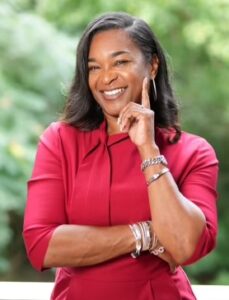 Election Day is three weeks away, and this year, it’s a five-way race for Richmond’s next mayor.
Election Day is three weeks away, and this year, it’s a five-way race for Richmond’s next mayor.
Richmond voters will decide between City Councilmember Andreas Addison, physician Danny Avula, former councilmember Michelle Mosby, community advocate Maurice Neblett, and nonprofit founder Harrison Roday.
The candidates responded to questions from BizSense about their priorities for Richmond, how they’ll support business growth and economic development, and other topics that will shape the city’s future.
Each day this week, we’re presenting their responses, with candidates presented in alphabetical order.
Today’s candidate is Michelle Mosby, a former City Council member and president who represented Richmond’s Ninth District from 2013 to 2016. The 55-year-old owns International Hair Salon in Forest Hill and is an agent with Icon Realty Group. She attended Virginia Union University and Norfolk State University and previously ran for mayor in 2016.
Previous candidate Q&As appear at the end.
Richmond BizSense: What are your economic development priorities for Richmond? How do you plan to support business growth in the city?
Michelle Mosby: My top economic priorities focus on creating a business-friendly environment and ensuring residents benefit from new opportunities. I will streamline the permitting process with digital systems to reduce delays and enhance inter-departmental coordination. Additionally, I will invest in workforce development by strengthening partnerships between schools and local industries, promoting STEM education, and expanding technical training. I also plan to maximize the potential of Richmond’s port to attract industries and create jobs, positioning the city as an economic leader.
RBS: What do you see as the No. 1 challenge holding back Richmond’s growth potential? How do you plan to address it?
MM: Richmond’s lack of affordable housing limits growth and workforce retention. I’ll pursue a comprehensive housing strategy, including public-private partnerships, zoning reforms, and leveraging state/federal resources. Key initiatives will include incentivizing mixed-income developments, preserving affordability, and expanding down payment assistance for first-time buyers.
RBS: Are you satisfied with the plan for the Diamond District development? Do you support the plan to redevelop the City Center area and replace the Coliseum?
MM: While the Diamond District offers potential for a worthy revitalization, I will ensure transparency and community engagement in financing and planning decisions on major development projects going forward that involve the transfer of publicly owned land and property, as well as the use of the city’s bond capacity. For City Center, I’ll advocate for financially sound, equitable redevelopment that prioritizes economic growth and avoids excessive commitments.
RBS: How will you address recent increases in real estate tax assessments in the city? Is more tax relief needed for small businesses and residents?
MM: Addressing rising real estate taxes is a priority. I’ll push for a fairer assessment process, accuracy, transparency and explore what other legal relief measures are available to localities in Virginia and the opportunity to expand senior tax relief. For businesses, I’ll propose targeted tax reductions and ensure tax dollars improve city services.
RBS: Are you satisfied with the current approach to encouraging housing affordability in the city? What would you do differently to address Richmond’s declared housing crisis?
MM: I’ll promote affordable housing through tax abatements, zoning reform, and increased public investment. These steps will foster diverse, affordable housing options and ensure long-term affordability.
RBS: Do you support how City Hall has been responding to issues surrounding meals tax collections, the finance department, and permitting and plan reviews? What else needs to be done?
MM: City Hall’s inefficiencies harm small businesses. I’ll overhaul outdated technology, fix staffing issues, and streamline permitting to create a business-friendly environment and boost competitiveness.
RBS: You’ve said that you would not retain the current chief administrative officer if elected. How will you keep leadership changes from disrupting city initiatives that are already underway?
MM: I’ll ensure a smooth leadership transition with experienced interim staff, continuity in city projects, and transparent communication to maintain stability and morale in city government.
Links to previous Q&A’s:
 Election Day is three weeks away, and this year, it’s a five-way race for Richmond’s next mayor.
Election Day is three weeks away, and this year, it’s a five-way race for Richmond’s next mayor.
Richmond voters will decide between City Councilmember Andreas Addison, physician Danny Avula, former councilmember Michelle Mosby, community advocate Maurice Neblett, and nonprofit founder Harrison Roday.
The candidates responded to questions from BizSense about their priorities for Richmond, how they’ll support business growth and economic development, and other topics that will shape the city’s future.
Each day this week, we’re presenting their responses, with candidates presented in alphabetical order.
Today’s candidate is Michelle Mosby, a former City Council member and president who represented Richmond’s Ninth District from 2013 to 2016. The 55-year-old owns International Hair Salon in Forest Hill and is an agent with Icon Realty Group. She attended Virginia Union University and Norfolk State University and previously ran for mayor in 2016.
Previous candidate Q&As appear at the end.
Richmond BizSense: What are your economic development priorities for Richmond? How do you plan to support business growth in the city?
Michelle Mosby: My top economic priorities focus on creating a business-friendly environment and ensuring residents benefit from new opportunities. I will streamline the permitting process with digital systems to reduce delays and enhance inter-departmental coordination. Additionally, I will invest in workforce development by strengthening partnerships between schools and local industries, promoting STEM education, and expanding technical training. I also plan to maximize the potential of Richmond’s port to attract industries and create jobs, positioning the city as an economic leader.
RBS: What do you see as the No. 1 challenge holding back Richmond’s growth potential? How do you plan to address it?
MM: Richmond’s lack of affordable housing limits growth and workforce retention. I’ll pursue a comprehensive housing strategy, including public-private partnerships, zoning reforms, and leveraging state/federal resources. Key initiatives will include incentivizing mixed-income developments, preserving affordability, and expanding down payment assistance for first-time buyers.
RBS: Are you satisfied with the plan for the Diamond District development? Do you support the plan to redevelop the City Center area and replace the Coliseum?
MM: While the Diamond District offers potential for a worthy revitalization, I will ensure transparency and community engagement in financing and planning decisions on major development projects going forward that involve the transfer of publicly owned land and property, as well as the use of the city’s bond capacity. For City Center, I’ll advocate for financially sound, equitable redevelopment that prioritizes economic growth and avoids excessive commitments.
RBS: How will you address recent increases in real estate tax assessments in the city? Is more tax relief needed for small businesses and residents?
MM: Addressing rising real estate taxes is a priority. I’ll push for a fairer assessment process, accuracy, transparency and explore what other legal relief measures are available to localities in Virginia and the opportunity to expand senior tax relief. For businesses, I’ll propose targeted tax reductions and ensure tax dollars improve city services.
RBS: Are you satisfied with the current approach to encouraging housing affordability in the city? What would you do differently to address Richmond’s declared housing crisis?
MM: I’ll promote affordable housing through tax abatements, zoning reform, and increased public investment. These steps will foster diverse, affordable housing options and ensure long-term affordability.
RBS: Do you support how City Hall has been responding to issues surrounding meals tax collections, the finance department, and permitting and plan reviews? What else needs to be done?
MM: City Hall’s inefficiencies harm small businesses. I’ll overhaul outdated technology, fix staffing issues, and streamline permitting to create a business-friendly environment and boost competitiveness.
RBS: You’ve said that you would not retain the current chief administrative officer if elected. How will you keep leadership changes from disrupting city initiatives that are already underway?
MM: I’ll ensure a smooth leadership transition with experienced interim staff, continuity in city projects, and transparent communication to maintain stability and morale in city government.
Links to previous Q&A’s:



